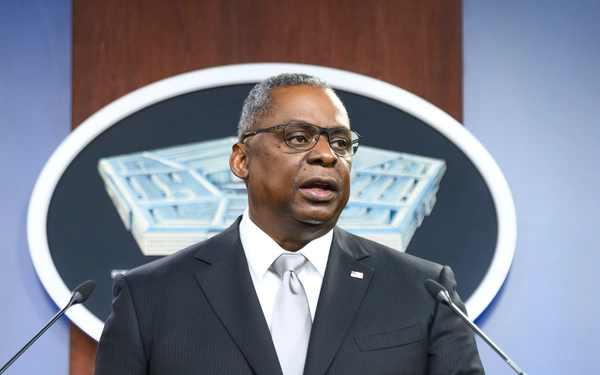The Pentagon‘s retaliation for the killing of three U.S. troops in Jordan by Iranian-backed militants may take the form of a campaign that will directly target Iranian capabilities and interests, rather than a one-off raid the likes of which have not deterred Iran and its proxies in recent months, Defense Secretary Lloyd J. Austin III told reporters Feb. 1.
Austin, making his first appearance at the Pentagon podium since entering the hospital in December to treat prostate cancer, said the militants that have struck at, injured, or killed U.S. troops in the Middle East in recent months could not have done so without Iran’s help, and a mere tit-for-tat attack on its capabilities isn’t sufficient.
“At this point, it’s time to take away even more capability” from Iran and its proxies “than we’ve taken in the past,” Austin said.
“I don’t think the adversaries are of a ‘one and done’ mindset,” he added. “They have a lot of capability. I have a lot more. So we’re going to do what’s necessary to protect our troops and our interests.”
While Iran has said that it provided weapons to Islamist groups in the region, it denies having urged or directed any attacks against U.S. forces. But Austin said, “how much Iran knew or didn’t know really doesn’t matter because Iran sponsors these groups.” Without Iran’s aid, “these kinds of things don’t happen,” he said.
President Joe Biden has said that he has decided how to respond to this latest strike in Jordan but has offered no more details. Austin declined to elaborate.
U.S. forces have been attacked in the Middle East more than 160 times since the latest Israel-Hamas conflict began. Iran-aligned groups have launched airstrikes in Yemen, Syria, and Lebanon, and Iran continues to supply its proxies with weapons such as drones and missiles capable of carrying out these assaults.
While some Iran-backed militants have halted their attacks on U.S. forces in the region since the deadly attack on Tower 22 in Jordan, the Houthi rebels in Yemen continue to attack commercial shipping in the Red Sea region.
Asked whether the U.S. will “escalate” military action in retaliation for the killings, Austin said the U.S. has so far done a good job at the opposite, preventing the Gaza crisis from becoming a regional war.
The U.S.’s goal since the Oct. 7 Hamas attack on Israel “was to make sure that we contain this crisis in Gaza and that we prevented things from spreading to a wider conflict,” he said.
The fact that there is not “an all-out conflict between Israel and Lebanese Hezbollah” means the crisis has been managed, he argued. The U.S. is in tight contact with the Israeli military to “make sure that that doesn’t blossom into … a war on another front. We don’t see Israel engaged in a conflict with other countries in the region.”
Austin acknowledged that “there’s been a lot of activity in the region,” but argued that “Iranian proxy groups have been attacking our troops even well before Oct. 7.”
“We’re not at war with Iran,” Austin said. “And, yeah, the Houthis continue to do things that are very irresponsible and illegal. So our goal is to make sure that we … continue to take away capability from the Houthis to do what they’ve been doing.”
The U.S. has struck Houthi missile and sensor sites in collaboration with British forces in recent days.
“We’re going to either be serious about freedom of navigation … or we’re not,” Austin said. The world is watching to see “how serious we are about this, and we are serious. And again, our partners and allies are serious about it, as well.”
Austin also called on Iran to stop providing the Houthis with “advanced conventional weapons.”
U.S. officials have said they believe another Iranian-backed group, the Islamic Resistance in Iraq, is responsible for the attack on Tower 22, a U.S. drone base in Jordan, where the three Army troops were killed.
Also during his briefing, Austin apologized for attempting to keep his recent medical treatment for cancer secret, saying that he had wanted to keep his diagnosis “private.” He acknowledged that President Biden was not informed of Austin’s incapacitation in a timely or appropriate manner.
“We did not handle this right, and I did not handle this right,” Austin admitted. “I should have told the President about my cancer diagnosis. I should have also told my team and the American public. And I take full responsibility. I apologize to my teammates and to the American people.”
Austin said flatly he does not plan to resign as a consequence of the incident, but an internal review is underway in the Pentagon which will fully explore what happened, what should have happened, and whether any punishment is warranted.
